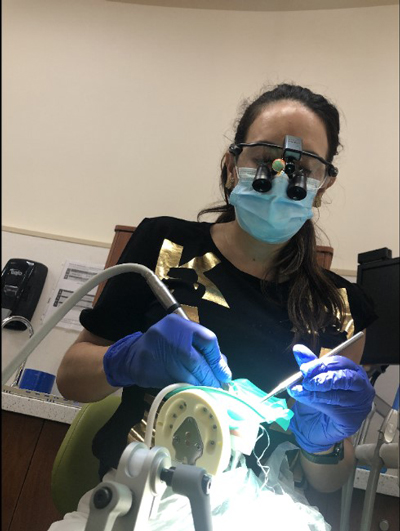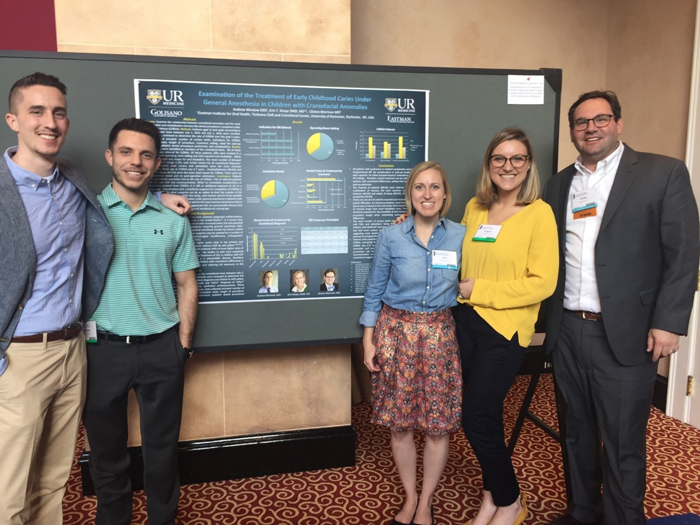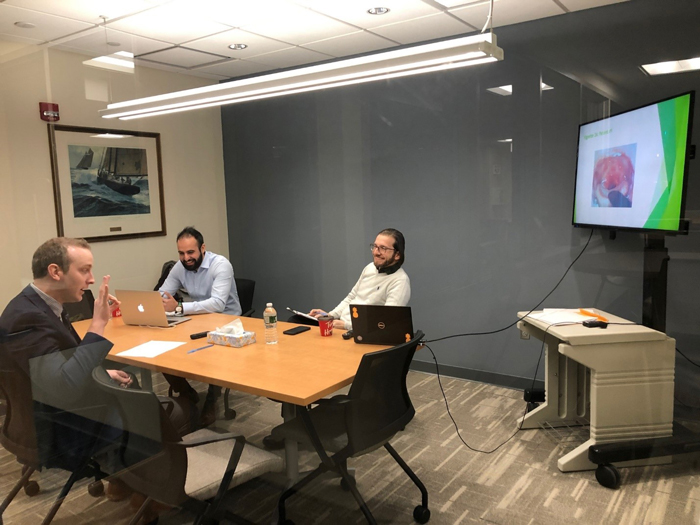Educational Activities
Educational Philosophy: Our program's mission is to use innovative teaching and learning to create empathetic and critically-thinking pediatric dentists, who embrace change and become advocates for the “whole child” in the communities they serve. We value: synthesis, reflection, innovation, active learning, interprofessional education, psychological safety, formative assessments, timely feedback, and addressing adult learning needs. We operate under this basic assumption: We are all "intelligent, capable, care about doing [our] best and want to improve." (Eppich et al., 2013)
- John Seely Brown This short video highlights the concepts of tinkering and embracing change, two foundational aspects to our educational philosophy. We believe that residents that practice both of these in all areas of their lives are the ones that get the most out of their time in residency.
- Backward Course Design Dentistry as a field is constantly advancing on many fronts within itself as well as how it fits into healthcare and society in general. Our goals in teaching is to prepare residents for this ever-changing nature. Jay McTighe, an educational writer and consultant, describes the strategy of backward course design that ensures that each learning activity is purposefully chosen to fulfill certain learning objectives. As faculty, we use these principles to carefully curate material and design activities to get desired results.
- Amy Edmondson This short Ted Talk discusses the importance of building psychological safety in the workplace especially in healthcare. As faculty, we know how important this is to our residents’ learning and constantly strive to establish this culture.
- Pediatric Dentistry Courses:
Our residency program offers a variety of pediatric dentistry courses that are intended to complement residents’ extensive clinical experiences. Each course is purposefully designed and scaffolded to integrate up to date literature, guidelines, readings, and lectures with case-based discussions and small group learning. Our courses take an active learning approach, reserving face-to-face time for discussion rather than conveying content. Using a hybrid approach, content is mostly off-loaded and completed asynchronously and online allowing residents to absorb content at their own pace and time. Synchronous sessions are primarily discussion-based and involve synthesizing the content with real clinical cases, extending knowledge into actual practice. Recognizing the needs of adult-learners, we value the power of reflection to encourage residents to learn more deeply. Most courses integrate written reflection and synthesis as forms of assessment (rather than just multiple-choice examinations), fostering critical thinking and communication skills. Our faculty strongly value innovation and frequently seek and integrate resident feedback to continuously improve the pediatric dentistry curriculum.
- Getting to Know Rochester Module (Summer R1): Designed as an immersive adjunct to the traditional orientation experience, this module completed during the orientation period encourages new residents to dive into the Rochester community. Residents engage in deep and thought-provoking readings, videos, lectures, and activities (such as a Rochester-area scavenger hunt) that help them to appreciate the challenges and barriers that many children in our community face. This module also includes self-reflection and activities to create a psychologically safe learning environment for our residents all while fostering teamwork. Residents expand upon their experiences from this module in the advocacy and ethics program. “I really enjoyed the module. Being able to get over the ‘awkwardness’ of meeting new colleagues was amazing. Everyone started day 1 being practically best friends!” - First year resident reflecting on this module
- Topics in Pediatric Dentistry (Summer R1): This course is completed during the first two months of residency. As one of the first courses a resident engages in, this course is structured to develop a foundation of knowledge and critical thinking skills from which to make clinical decisions for patients. The course includes short modules on Oral Trauma, Oral Pathology, Oral Surgery, Periodontics, Radiology, Perinatal and Anticipatory Guidance, Behavior Guidance, Adjunctive Treatment Planning, etc. “It was really nice to be able to take a step back and learn everything didactically about pediatric dentistry so that when we started seeing patients we felt more comfortable.” - First year resident
- Hospital Based Dentistry (Summer R1): This short course gives residents an overview of pediatric dental treatment in the hospital setting, including assessing patients to determine if they are candidates, completing referral forms, and creating follow-up plans for after treatment.
- Clinical Techniques (Summer R1): This short course is designed to give first year residents evidence-based knowledge on various clinical techniques, dental materials, and treatment planning through readings and discussion. Simulation through hands-on sessions using typodonts will allow for skill development in a safe, controlled setting before treating patients in the clinic. This is also supplemented by a hands-on, one-on-one experience in the operating room with pediatric restorative and surgical techniques at the beginning of the residency program.

- Behavior Guidance (Fall R1): This semester long course offered to first year residents in the Fall is part of a unique collaboration with the Psychology Department at the University of Rochester. Class sessions are guided by pediatric dentists, psychologists, and other professionals in related fields to give the resident a thorough understanding of this topic. Though sedation and general anesthesia (pharmacologic means for behavior guidance) are occasionally options available to pediatric dentists when considering how to provide quality care to their patients in safe manner, the use of various non-pharmacologic behavior guidance strategies is paramount to success in the field. The effectiveness of behavior guidance techniques is very patient- and provider-dependent; time and practice using the basic techniques allows for a pediatric dentist to develop their own style that can be modified depending on the patient. A mixture of discussion of articles, readings, role-playing, case scenarios, and reflection give the resident a deep understanding of behavior guidance in the context of pediatric dentistry.
- Special Health Care Needs (Fall and Spring R1 & R2): This course takes an interdisciplinary approach to caring for children with medically complex conditions and special health care needs. Residents interact with guest speakers from various medical specialties from URMC who present on their area of expertise. Topics range from bleeding disorders, congenital heart defects, oncology, autism, craniofacial differences, transgender and LGBTQ+, to asthma. These talks are integrated with the medical and dental literature during case-based small-group learning experiences to extend resident learning from the understanding level to the application level, extending knowledge into actual practice. Residents learn key skills in interpreting medical histories and communicating with other healthcare providers. Formative assessments through asynchronous written reflection and online discussion boards develop further synthesis of information.
- Sedation in Pediatric Dentistry (Spring R1): First year residents take this course before treating patients with sedation in the clinic. Patient selection criteria, pharmacology of sedative agents, physiology of pediatric airway, indications and contraindications for sedation, sedation regimens, identification and management of emergencies, and evaluation of patient for discharge are discussed in depth. Relevant journal articles are reviewed and discussed. Also, residents complete a hands-on skills lab with simulated medical emergencies, focusing on airway management. Taking an interdisciplinary approach, pediatric anesthesiologists and allied health providers deliver lectures in their area of expertise.
- Sedation Simulation Module (Summer R2): The goal of this module is to apply knowledge and skills in the management of patients presenting for simulated sedation appointments. This module is completed by residents after the didactic sedation course and before treating patients in the clinic with sedation. Residents will apply theory to simulation case scenarios to practice evaluating if a patient is a candidate for sedation, calculating drug dosages accurately, presenting cases to faculty attendings, communicate with parents to obtain informed consent or give post-operative instructions, evaluating effectiveness of monitoring equipment, and react to patients’ needs during adverse events. Focused feedback is provided on each case to help each resident improve skills in various competencies. “I learned a lot during this module because I had to refresh my memory and focus on emergencies. I have always felt hesitant about my knowledge related to handling emergencies however now I feel very competent and much more confident in handling emergencies.” Second year resident after completing the sedation simulation module.
- Practice Management (Fall and Spring R1 & R2): This course meets one Friday a month throughout the two years of residency and is taught by a member of our part-time faculty who is an experienced pediatric dentist in private practice. He shares what he has learned over the years as the secret to having a successful, rewarding career in pediatric dentistry.
- Advocacy and Ethics (Year-Round R1 & R2): This program meets once a month for synchronous face-to-face sessions. It builds off the “Getting to Know Rochester” orientation module addressing the essential question of “how can pediatric dentistry residents address injustices in health in our community?”. Asynchronously and using development time, residents develop partnerships with community-based organizations to create initiatives to address injustices in health and advocate for our community. This program spans the two years of the residency program and helps develop and practice skills related to advocacy, inclusion, and diversity. Residents advocate at the local and community level and also have the opportunity to attend the AAPD’s Advocacy Day and advocate at the national-level. Residents also work closely with our social workers during this program.
- Interceptive Orthodontics (Fall R1): This course is taught by Eastman’s orthodontic faculty and focuses on giving residents a foundational of knowledge on diagnosis and treatment planning, orthodontic cases in the mixed dentition.
- Orthodontics Lab (Fall R1): This hands-on course is taught by one of our part-time pediatric dentistry faculty members who has extensive experience with orthodontics. The orthodontic literature and core articles are integrated in discussions and hands-on experiences fabricating orthodontic appliances.
- Research Methods & Design (Spring R1): During this carefully scaffolded experience, lectures, readings, and discussions on research methods are integrated with a long-term project to develop an implementable research protocol on a topic of choice. Residents later submit this protocol to the University of Rochester’s IRB for approval and then move on to complete the research project utilizing all available resources. Residents present their research at local and national meetings and draft a publishable-quality research manuscript.

- Microbiology & Immunology (Fall R2): This course provides residents a refresher course for caries and periodontal microbiology, reviewing pathology, and virulence factors. In addition, we provide important concepts in understanding core topics in Immunology and Host defense as well as Infection control principles and regulations in a dental practice setting.
- Perinatal Oral Health (Odd Years, Spring)
- Mock Oral Boards (Spring R2): Our program values board-certification of our graduates. In the spring of second year, residents complete a mock oral board exam. This exam is developed collaboratively with pediatric dentistry faculty and alumni. The exam is structured similarly to the American Board of Pediatric Dentistry’s oral exam and to avoid bias, it is administered by alumni.

- Lunch Seminars (Year-Round, R1 & R2):
- Trauma and Hospital Consultation Case Discussions: An interactive, case-based conference every Monday facilitated by on-call residents focusing on clinical reasoning and decision-making. The larger group is divided into smaller groups to include a mix of residents and faculty, and a “bottom up” hierarchy is promoted to encourage participation of more junior learners. This seminar also helps prepare residents for oral board exams by practicing case evaluation and on-the-spot critical-thinking skills. These discussions also facilitate effective hand-offs of complex trauma and hospital cases.
- Medically Complex Cases: This small group, case-based conference is presented by residents every Tuesday during both first and second year. A faculty member facilitates discussion focused on clinical reasoning and shares expertise. Residents integrate literature with clinical cases, providing an evidence-based approach to clinical care of children with complex medical conditions.
- Clinical Cases in Pediatric Dentistry: Each case review presents the patient’s history and clinical presentation to determine if any other diagnostic information is necessary and what would be the best approach to follow. A problem list and differential diagnosis can then be established for each case along with the proposed treatment plan. By establishing a systematic approach, residents should become better prepared to provide patient-centered care. At the end of this course, students should be able to integrate knowledge from didactic courses, peer reviewed articles, and reference textbooks for this purpose.
- Pediatric Orthodontic Cases: Residents present orthodontic cases in a seminar-style format guided by orthodontic faculty. This case discussion occurs on every other Thursday at lunch.
- Eastman Dental Core Courses: Our residency program values interdisciplinary care. Eastman offers several core, interdisciplinary courses to all dental residency programs. These encourage interaction and collaboration between divisions. Core courses run the length of a semester and include:
- Orofacial Pain
- Evidence Based Dentistry
- Ethics
- Epidemiology
- Cardiology
- Perio (audit)
- Oral Pathology (audit)
- Growth & Development
- Departmental Grand Rounds